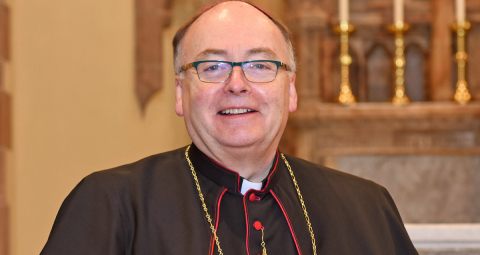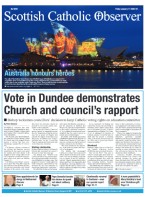BY Peter Diamond | January 17 2020 | ![]() 0 COMMENTS
0 COMMENTS ![]() print
print

Voting rights outcome demonstrates Church and council’s rapport
Publication Date: 2020-01-17
Bishop welcomes councillors’ decision to keep Catholic voting rights on education committee
Dunkeld Diocese has welcomed an almost unanimous decision to keep Catholic voting rights on Dundee City Council’s education committee.
The decision came after Independent councillor Gregor Murray called for Church reps to be stripped of such powers, a motion that was overwhelmingly quashed by 26 votes to two.
Cllr Murray, a former convener of the children and families services committee for the council, also asked for teachers and trade unions to be stripped of their voting rights on the city’s education committee at the proposal which took place on Monday January 13.
Motion
Cllr Murray asked fellow councillors to agree that ‘with effect from the next meeting of the children and families services committee, only elected members of the council, with a mandate from the electorate, should be allowed to vote on any council committee or sub-committee.’
The councillor accused the Catholic Church of having ‘spread its transphobia across the city,’ meanwhile stating the motion was ‘not an attack on religion’ and claimed the change would help local democracy as Dundee City Council residents have ‘no say’ in selecting Church, teaching and trade union reps on the education committee.
Working relationship
Bishop Stephen Robson of Dunkeld Diocese has welcomed the council’s decision to retain the status quo.
The bishop said: “Dundee City Council has had a very good and fruitful working relationship with the Diocese of Dunkeld over many years. The proposal to remove voting rights for Faith community representatives was advanced by only one councillor. It was almost unanimously voted down.”
He added that he has worked alongside Canon Tom Shields, vicar episcopal for education in Dunkeld and Moira Leck, the Church representative on the council’s education committee, to ‘try to defuse the situation and were delighted that the council reacted so clearly and overwhelmingly.’
He added: “The fruitful and genial collaboration between the Diocese of Dunkeld and Dundee [City] Council can now continue serving the needs of Catholic education into the future.
“We were grateful for the opportunity to be proactive rather than reactive to the proposal.”
Bishop’s statement
The bishop had encouraged Catholics to contact their local elected official ahead of the motion in a statement to be read at Masses across the city on January 11 and 12, highlighting that ‘Church representatives have always used their vote responsibly and thoughtfully, allowing Dundee City Council and the Catholic Church to be effective partners in supporting young people and parents.’
In his statement, the bishop had warned the motion was an attempt to eventually erase Catholic schools from the city altogether.
He said: “Catholic representatives on Dundee City Council act to safeguard the interests of Catholic schools. It would be naïve to think that this motion is anything other, in the minds of some in our city, as a first step to removing Catholic schools altogether.”
Dismissed
Barbara Coupar, director of the Scottish Catholic Education Service (SCES) has also welcomed the news.
She told the SCO: “The calls to remove voting rights have been dismissed without debate in the majority of councils because they value the contribution of the non-elected members, including parents, teachers, unions and Church representatives.
“The debate and vote in Dundee city has demonstrated that councils are not in favour of reducing their responsibility to their constituents, or removing engagement with respected partners, but want to maintain and develop positive relationships with members of their community.”
Others who supported keeping the rights of Church representatives on the education committee included Dundee’s Lord Provost Ian Borthwick, who stated it would have been ‘shortsighted and foolish in the extreme’ to risk hurting the relationship between the council and the Church, especially during a time where the city council is working on school attainment levels. The lord provost believed the item should have been withdrawn.
Sadness
Councillor Richard McCready, based in Dundee City Council, was national secretary for Justice and Peace Scotland from 2003 and 2007. In a statement released on his website, he said he was ‘saddened’ to have to speak and vote against the plans.
In his blog post, councillor McCready wrote: “I agreed with the Lord Provost that it would have been better if the item had been withdrawn.
“Fundamentally, I do not know what the problem is that this proposal is meant to fix.”
He added: “I think that these external voices with votes make a difference to our community and to our decisions.”
Cllr McCready stated his ward colleague, Bailie MacPherson, suggested the council should broaden the voting rights to the parent and pupil representatives on the Children and Families Services Committee in Dundee and stated he thought the debate by Cllr Murray was ‘unfortunate and unnecessary.’
Hard work
He wrote: “I want to pay tribute to the hard work of teachers and pupils in our schools. But everyone involved in education in Dundee, that should include councillors as much as anyone else, knows that we must do better collectively. We need to work together to find ways to make a difference for our young people.
“I do not think that tinkering with the committee structure is going to make a real difference.
“When the vote came I joined the majority of councillors and the proposal was defeated by 26 votes to two.
“I hope in the not too distant future that we will see as much energy expended on discussing plans to improve the outcomes for all the young people in our city.”










